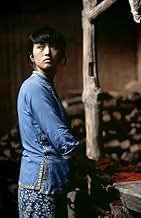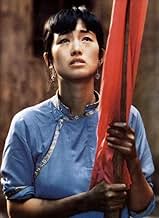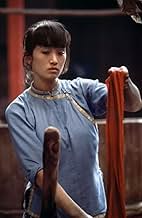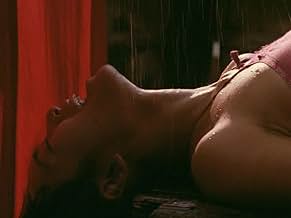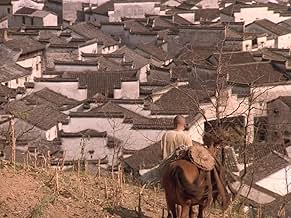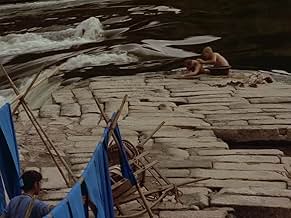PUNTUACIÓN EN IMDb
7,6/10
9,4 mil
TU PUNTUACIÓN
Añade un argumento en tu idiomaIn rural China, the young bride of a tyrannical owner of a silk-dyeing business finds temporary solace in the arms of her husband's nephew, but problems arise when she becomes pregnant.In rural China, the young bride of a tyrannical owner of a silk-dyeing business finds temporary solace in the arms of her husband's nephew, but problems arise when she becomes pregnant.In rural China, the young bride of a tyrannical owner of a silk-dyeing business finds temporary solace in the arms of her husband's nephew, but problems arise when she becomes pregnant.
- Nominado para 1 premio Óscar
- 8 premios y 6 nominaciones en total
Reseñas destacadas
This allegorical melodrama is most notable for its use of color: the film is mostly set in a small dye factory/household and the beautiful, brilliant colors of the dye are in stark contrast to the drabness of the building itself and the ugly lives that are lived there. Life is so ugly because household head Jin-shan is an impotent old man who has recently purchased an expensive young wife. Since he did purchase her, he feels it is his right to beat her every time he fails to perform sexually. Soon, his adopted son Tian-qing gets wind of his step-moms' nightly beatings and he begins to comfort her. It doesn't take much of this comforting to get her pregnant with a son that ends up being even more evil than Jin-shan himself, especially since young Tian-bai refuses to acknowledge Tian-qing in any way.
Characterizations are very slim here, most likely to ensure that the viewer doesn't try to look at the characters as anything more than allegorical stand-ins for a government so repressive that they banned the film for portraying an extramarital affair and so stupid that they didn't realize that the film is highly critical of their regime. Jin-shen is the stand-in for the government that treats its people as slaves and he's ironically aided by the ignorant Tian-bai who completely fails to understand the situation and is guided by a misplaced loyalty. Of course the ill-fated central couple is representative of the middle class people who understand the situation they are in but lack the power to change it.
The film works as an allegory but comes off as rather unengaging if taken literally since the characters aren't fleshed out. This is a particular problem with Tian-qing as he has numerous chances to better his situation but never acts rationally and Tian-bai who acts completely inhuman. Still, the direction and visuals are handled well enough to keep the film from being a mere exercise in didacticism.
Characterizations are very slim here, most likely to ensure that the viewer doesn't try to look at the characters as anything more than allegorical stand-ins for a government so repressive that they banned the film for portraying an extramarital affair and so stupid that they didn't realize that the film is highly critical of their regime. Jin-shen is the stand-in for the government that treats its people as slaves and he's ironically aided by the ignorant Tian-bai who completely fails to understand the situation and is guided by a misplaced loyalty. Of course the ill-fated central couple is representative of the middle class people who understand the situation they are in but lack the power to change it.
The film works as an allegory but comes off as rather unengaging if taken literally since the characters aren't fleshed out. This is a particular problem with Tian-qing as he has numerous chances to better his situation but never acts rationally and Tian-bai who acts completely inhuman. Still, the direction and visuals are handled well enough to keep the film from being a mere exercise in didacticism.
Ju Dou was censored and banned in China because it was considered politically dangerous by portraying the lead female character as rebelling against the male in authority. After it was promptly banned, it was resurrected and made available for Western Hemisphere audiences via the official protests of directors like Woody Allen, Martin Scorsese, George Lucas and Stephen Spielberg. As a result, we have at our disposal, one of the most beautifully constructed love stories ever made.
Despite the fact that this film was made within our contemporary era it presents an honest and frank portrayal without much sex or violence. Nevertheless, it still remains an intense piece of cinema. Interestingly, even though the story is set in the 1920's, the attitudes and manner of behavior reflect the attitudes of our times rather than the 1920's. The story is essentially a variation on a fairly familiar story-the basic premise being that of an older man being married to a younger woman, but is incapable of both satisfying her and providing offspring, so she finds a younger man who is capable of satisfying her. When she does, they conceive a child that the old man thinks is his. This usually makes for a poignant response to the old man's dilemma, because usually, the old man is portrayed as a sympathetic figure. In Ju Dou, he is anything but sympathetic, which makes for a whole new series of conflicting responses from the viewer.
Ju Dou is a film that transitions well between scenes, which is apparent in the film's structure. When seeing Ju Dou the viewer may want to take into consideration the three part structure of the film: a.) The beginning to where the old man becomes crippled b.) The second portion, which involves the birth of the son to where one of the lead character's dies and c.) The third portion, which involves the child. Ju Dou is a quiet and menacing film. When it hits its moments of high drama, it is very similar to a Greek tragedy. What stands out is the stoic nature of the characters, the incredible love scenes, and the final shocking conclusion.
Despite the fact that this film was made within our contemporary era it presents an honest and frank portrayal without much sex or violence. Nevertheless, it still remains an intense piece of cinema. Interestingly, even though the story is set in the 1920's, the attitudes and manner of behavior reflect the attitudes of our times rather than the 1920's. The story is essentially a variation on a fairly familiar story-the basic premise being that of an older man being married to a younger woman, but is incapable of both satisfying her and providing offspring, so she finds a younger man who is capable of satisfying her. When she does, they conceive a child that the old man thinks is his. This usually makes for a poignant response to the old man's dilemma, because usually, the old man is portrayed as a sympathetic figure. In Ju Dou, he is anything but sympathetic, which makes for a whole new series of conflicting responses from the viewer.
Ju Dou is a film that transitions well between scenes, which is apparent in the film's structure. When seeing Ju Dou the viewer may want to take into consideration the three part structure of the film: a.) The beginning to where the old man becomes crippled b.) The second portion, which involves the birth of the son to where one of the lead character's dies and c.) The third portion, which involves the child. Ju Dou is a quiet and menacing film. When it hits its moments of high drama, it is very similar to a Greek tragedy. What stands out is the stoic nature of the characters, the incredible love scenes, and the final shocking conclusion.
Mesmerizing melodrama set in 1920's China about a young woman who is forced to wed an abusive dye mill owner, who tortures her like an animal for not giving him a son, but more importantly, an heir. She decides to indulge in an affair with the nephew of her husband. Enthralling study of passion, sensation and burning for revenge brought to life in an extraordinary fashion which earned the film an Oscar nomination for the Best Foreign Language Film of 1990.
'Ju Dou' is a fine example of cinema at its rawest. Director Zhang Yimou hardly makes any use of special effects, keeps the background score at a minimum, makes the sets look very real (they don't even look like movie-sets) and yet he avoids his movie to look like a documentary. He seems to have relied most on the camera and actors to do the work. Even though the film is set in the 20s, 'Ju Dou' was one of the most controversial movies in China and it was banned arguably due to the way a powerful elderly man was depicted, a woman rebelling against a man and/or the depiction of injustice towards women in China and preference for a male heir.
A natural beauty, Gong Li in her early days, plays the title role of a peasant girl who's sold to an evil old man. This couldn't have been an easy part for a young actress to play but Li makes it look otherwise. She is phenomenal to watch. Li Wei as the cruel master does a great job too and he adds a humanity to his character that makes us sympathize for him. Li Baotian, as the evil master's nephew with whom Ju Dou has an illicit relationship, is just as brilliant.
The cinematography deserves special mention and some of the visuals and sceneries of the Chinese landscape are breathtaking. The writing is very good as the film sticks to the main story (no subplots) and the characters are rich, even that of the child who doesn't say anything. 'Ju Dou' does tackle a lot of issues (which is perhaps why it was banned) that are displayed graphically or hinted specifically. Also there's a lot of irony in the story that beautifully works. For example how the impotent evil master was once so intimidating that he tortured his previous wives to death but how quickly this turns around after Ju Dou gives birth and later on he sees hope in the child and uses him to vindicate his helpless state but that too has consequences. Yimou presents it all without throwing it at the audiences face.
Apart from the aforementioned, there's a visually poetic feel about 'Ju Dou'. It's executed in a very artistic way. The way he shows the dye mill, (which looks like any other old overused mill), and then the colourful sheets of cloth make is dazzling to look at. Also the mountains and river are shot in such a way that they look like beautiful postcards. Then there's another shot of a beaten up Gong Li sitting next to a lantern while the flickering firelight reveals her sad face.
I found the ending a little too abrupt. Perhaps Yimou should have developed this. Lastly, Yimou's intentions seem honest in the way he tells the story. He does not go over the top by including melodrama or making it preachy nor does he make it too simplistic. It's one of his finest works and some might find it difficult to watch but in the end it's a fine work of art that tells a relevant story.
A natural beauty, Gong Li in her early days, plays the title role of a peasant girl who's sold to an evil old man. This couldn't have been an easy part for a young actress to play but Li makes it look otherwise. She is phenomenal to watch. Li Wei as the cruel master does a great job too and he adds a humanity to his character that makes us sympathize for him. Li Baotian, as the evil master's nephew with whom Ju Dou has an illicit relationship, is just as brilliant.
The cinematography deserves special mention and some of the visuals and sceneries of the Chinese landscape are breathtaking. The writing is very good as the film sticks to the main story (no subplots) and the characters are rich, even that of the child who doesn't say anything. 'Ju Dou' does tackle a lot of issues (which is perhaps why it was banned) that are displayed graphically or hinted specifically. Also there's a lot of irony in the story that beautifully works. For example how the impotent evil master was once so intimidating that he tortured his previous wives to death but how quickly this turns around after Ju Dou gives birth and later on he sees hope in the child and uses him to vindicate his helpless state but that too has consequences. Yimou presents it all without throwing it at the audiences face.
Apart from the aforementioned, there's a visually poetic feel about 'Ju Dou'. It's executed in a very artistic way. The way he shows the dye mill, (which looks like any other old overused mill), and then the colourful sheets of cloth make is dazzling to look at. Also the mountains and river are shot in such a way that they look like beautiful postcards. Then there's another shot of a beaten up Gong Li sitting next to a lantern while the flickering firelight reveals her sad face.
I found the ending a little too abrupt. Perhaps Yimou should have developed this. Lastly, Yimou's intentions seem honest in the way he tells the story. He does not go over the top by including melodrama or making it preachy nor does he make it too simplistic. It's one of his finest works and some might find it difficult to watch but in the end it's a fine work of art that tells a relevant story.
I have become a huge fan of Gong Li and have now purchased five films that she has appeared in. Ju Dou is by far her sexiest and most daring performance. She plays the lead character in the film named Ju Dou. She is a poor woman who is purchased by an old, impotent, and extremely cruel and abusive man who owns a Dye Factory. His name is Yang Jinshan. He wants to have an heir to succeed him but is having trouble getting his battered bride to conceive. At this juncture, his nephew, named Yang Tianqing, who is a mild mannered pervert who likes to be voyeuristic and watch his Uncle's new bride wash herself. Before he knows it, as the uncle is out on a trip, Ju Dou seduces him in one of the most erotic seduction scenes of all time. This is done in a very classy way, there is no nudity, but what is implied is quite obvious. In the aftermath of these proceedings, Ju Dou becomes pregnant and informs her "jackass" of a husband that she is going to give him a son. He is quite pleased and they end up naming the son, Yang Tianbi. Eventually the husband is crippled in an accident, and is later killed in an accident involving his son. For some odd reason, the son is as evil as can be and hates his mother and real Dad with a passion and proceeds with a plot to kill them. 2/3 of this movie is great. The last third in my opinion is that it is stupid. It is kind of like they tried to make Damien, The Omen, Part 4. The cinematography is excellent, but the last third of the movie was poorly done in my opinion. Like I said, this was Gong Li's sexiest role. She really has a way to express herself to the camera. However, the movie falls short of the mark.
¿Sabías que...?
- CuriosidadesIn the original novel Tianqing is the biological nephew of Jinshan and the story itself is about incest by affinity. The makers of the film version decided not to use the incest angle, so in the film Tianqing and Jinshan are not biologically related.
Selecciones populares
Inicia sesión para calificar y añadir a tu lista para recibir recomendaciones personalizadas
- How long is Ju Dou?Con tecnología de Alexa
Detalles
Taquilla
- Recaudación en Estados Unidos y Canadá
- 1.986.433 US$
- Fin de semana de estreno en EE. UU. y Canadá
- 10.300 US$
- 10 mar 1991
- Recaudación en todo el mundo
- 1.986.433 US$
Contribuir a esta página
Sugerir un cambio o añadir el contenido que falta

Principal laguna de datos
By what name was Semilla de crisantemo (1990) officially released in Canada in English?
Responde

